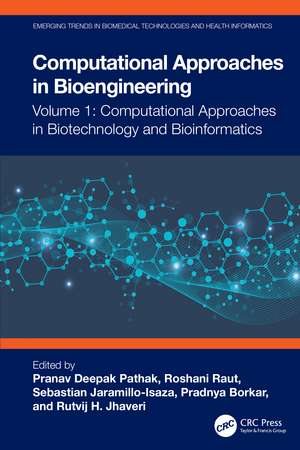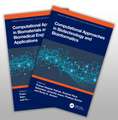Computational Approaches in Biotechnology and Bioinformatics: Emerging Trends in Biomedical Technologies and Health informatics
Editat de Pranav Deepak Pathak, Roshani Raut, Sebastian Jaramillo-Isaza, Pradnya Borkar, Rutvij H. Jhaverien Limba Engleză Hardback – 27 mai 2024
FEATURES
- Covers a wide range of subjects from biomedical engineering like wearable devices, biomaterials, synthetic biology, phytochemical extraction, and prosthetics
- Explores AI, machine learning, big data analysis, and algorithms in biomedical engineering and bioinformatics in an easily understandable format
- Includes case studies on the role of medical robots in surgery and the determination of protein structure using genetic algorithms
- Discusses genetic diagnosis, classification, and risk prediction in cancer using next-generation sequencing in oncology
Preț: 1064.85 lei
Preț vechi: 1298.59 lei
-18% Nou
Puncte Express: 1597
Preț estimativ în valută:
203.79€ • 211.14$ • 170.07£
203.79€ • 211.14$ • 170.07£
Carte tipărită la comandă
Livrare economică 21 martie-04 aprilie
Preluare comenzi: 021 569.72.76
Specificații
ISBN-13: 9781032406107
ISBN-10: 1032406100
Pagini: 404
Ilustrații: 240
Dimensiuni: 156 x 234 x 24 mm
Greutate: 0.74 kg
Ediția:1
Editura: CRC Press
Colecția CRC Press
Seria Emerging Trends in Biomedical Technologies and Health informatics
Locul publicării:Boca Raton, United States
ISBN-10: 1032406100
Pagini: 404
Ilustrații: 240
Dimensiuni: 156 x 234 x 24 mm
Greutate: 0.74 kg
Ediția:1
Editura: CRC Press
Colecția CRC Press
Seria Emerging Trends in Biomedical Technologies and Health informatics
Locul publicării:Boca Raton, United States
Public țintă
Professional ReferenceCuprins
1. Computational Approaches for Discovery of New Drugs for Inflammatory and Infectious Diseases 2. A Bioinformatics Approach Towards Plant-Based Anticancer Drug Discovery 3. Recent Advances in Anticancer Activity and Bioinformatics Approach from Potential Plants 4. Extraction of Phenolic Compounds from some Ayurvedic Botanicals (Nigella sativa, Andrographis paniculata and Phyllanthus amarus) and Evaluation of their Antibacterial and Antiviral Properties using Bioinformatics Approaches 5. Phenolic Compounds: A Systematic Review of Extraction Methods and A Bioinformatics Approach for their Antibacterial and Antiviral Properties 6. Role of Tissue Engineering in The Treatment of Degenerative Diseases 7. An Algorithmic Soft Computing Technique for Identifying Lipase-producing Yeast Using its Gene Expression Data 8. Plant Phenolic Compound Isolation and its Bioinformatics Approaches of Molecular Mechanisms in Antimicrobial Activities and Resistance 9. Computational Evaluation of Peanut Skin Bioactive Compounds for Cancer Treatment 10. Bioinformatics Tools for the Discovery of Potential Anti Diabetic Drugs from Lichens 11. In silico Analysis of Lapachol and Nickel Lapachol Against Tumor Proteins – Insights into the Molecular Interactions and Drug Likeliness 12. Transcriptome Analysis Identifies Genes Involved in Vitamin B Biosynthesis in Solanum virginianum Whole Fruit 13. Identification of Compounds Present in the Eethanolic Extract of Cecropia pachyatachya Trécul Leaves by CG-MS and in silico Studies with the Enzymes 5-LOX and α-1-antitrypsin 14. Computational Biology Approach in Viticultu 15. Screenings of Inhibitory Ability of Vietnamese Medicinal Plants-based Substances and Protein Related Structures: Computation-Pharmacological Experiment Correlation
Notă biografică
Dr. Pranav D. Pathak is an Associate professor in MIT School of Bioengineering Sciences & Research, Pune. He received his undergraduate, postgraduate degrees from Amravati University and doctoral degrees from Visvesvaraya National Institute of Technology, Nagpur, India. His research interests include use of Indian traditional knowledge in medicines, biorefinery, adsorptive separation, solid waste utilization, and wastewater treatment.
Dr Roshani Raut is an experienced academic and researcher in the field of Computer Science and Engineering at Pimpri Chinchwad College of Engineering, Savitribai Phule Pune University, Pune, India. She completed her PhD in Computer Science and Engineering from SGBAU, Maharashtra, india, ME from VIT, pune, India and Bachelor’s in Computer Science and Engineering from Nagpur Univeristy. She has more than 18 years of experience and is currently working as Associate Professor in the Department of Information Technology and also handling the charge of Associate Dean International Relations, in Pimpri Chinchwad College of Engineering, Pune, India.
Sebastián Jaramillo-Isaza is currently working as a Principal Professor in Biomedical Engineering, at the School of Medicine and Health Sciences at the Universidad del Rosario, Colombia. He received a PhD in Biomechanics, Bioengineering, and Biomaterials from Sorbonne Universités - Université de Technologie de Compiègne (UTC), France. He completed his masters from École Nationale d’Ingénieurs de Metz (ENIM), Metz, France, and received his Bachelor’s in Bioengineering from the University of Antioquia, Medellin, Colombia. His current research interests are centred around the fields of biomechanics, assistive technologies, neuroengineering, and rehabilitation engineering.
Dr. Pradnya Borkar, AssociateProfessor, Department of Computer Science and Engineering and R&D Cell Incharge, Jhulelal Institute of Technology, Nagpur did her B.E. in Computer Technology in year 2002, M.Tech in Computer Science and Engineering in 2008 and PHD in Computer Science and Engineering in 2018 from RashtrasantTukdoji Maharaj Nagpur University (formerly Nagpur University).She has worked with many reputed organizations and has an overall teaching experience of around 19 years. She has filed two patents. She has published books as "Data Warehousing and Mining" and "Object Oriented Modelling". Her area of interests are high performance computing, bioinformatics, parallel computing, database management systems, compilers and theory of computation. She is a member of ISTE, CSI, and SDIWC.
Dr. Rutvij H. Jhaveri is an experienced researcher working in the Department of Computer Science & Engineering, Pandit Deendayal Energy University, Gandhinagar, India since Dec. 2019. He conducted his Postdoctoral Research at Delta-NTU Corporate Lab for Cyber-Physical Systems, Nanyang Technological University, Singapore. Before joining PDEU, he worked for more than seventeen years at S.V.M. Institute of Technology affiliated to Gujarat Technological University. He completed his PhD in Computer Engineering from CHARUSAT University, India, Master’s degree from Saradar Vallabhbhai National Institute of Technology (SVNIT), Surat and Bachelor's degree from Birla VishvakarmaMahavidyalaya, V. V. Nagar. Apart from numerous academic assignments, he shouldered the responsibility as Head of the Department (IT) for 5 years. In 2017, he was awarded with prestigious Pedagogical Innovation Award by Gujarat Technological University.
Dr Roshani Raut is an experienced academic and researcher in the field of Computer Science and Engineering at Pimpri Chinchwad College of Engineering, Savitribai Phule Pune University, Pune, India. She completed her PhD in Computer Science and Engineering from SGBAU, Maharashtra, india, ME from VIT, pune, India and Bachelor’s in Computer Science and Engineering from Nagpur Univeristy. She has more than 18 years of experience and is currently working as Associate Professor in the Department of Information Technology and also handling the charge of Associate Dean International Relations, in Pimpri Chinchwad College of Engineering, Pune, India.
Sebastián Jaramillo-Isaza is currently working as a Principal Professor in Biomedical Engineering, at the School of Medicine and Health Sciences at the Universidad del Rosario, Colombia. He received a PhD in Biomechanics, Bioengineering, and Biomaterials from Sorbonne Universités - Université de Technologie de Compiègne (UTC), France. He completed his masters from École Nationale d’Ingénieurs de Metz (ENIM), Metz, France, and received his Bachelor’s in Bioengineering from the University of Antioquia, Medellin, Colombia. His current research interests are centred around the fields of biomechanics, assistive technologies, neuroengineering, and rehabilitation engineering.
Dr. Pradnya Borkar, AssociateProfessor, Department of Computer Science and Engineering and R&D Cell Incharge, Jhulelal Institute of Technology, Nagpur did her B.E. in Computer Technology in year 2002, M.Tech in Computer Science and Engineering in 2008 and PHD in Computer Science and Engineering in 2018 from RashtrasantTukdoji Maharaj Nagpur University (formerly Nagpur University).She has worked with many reputed organizations and has an overall teaching experience of around 19 years. She has filed two patents. She has published books as "Data Warehousing and Mining" and "Object Oriented Modelling". Her area of interests are high performance computing, bioinformatics, parallel computing, database management systems, compilers and theory of computation. She is a member of ISTE, CSI, and SDIWC.
Dr. Rutvij H. Jhaveri is an experienced researcher working in the Department of Computer Science & Engineering, Pandit Deendayal Energy University, Gandhinagar, India since Dec. 2019. He conducted his Postdoctoral Research at Delta-NTU Corporate Lab for Cyber-Physical Systems, Nanyang Technological University, Singapore. Before joining PDEU, he worked for more than seventeen years at S.V.M. Institute of Technology affiliated to Gujarat Technological University. He completed his PhD in Computer Engineering from CHARUSAT University, India, Master’s degree from Saradar Vallabhbhai National Institute of Technology (SVNIT), Surat and Bachelor's degree from Birla VishvakarmaMahavidyalaya, V. V. Nagar. Apart from numerous academic assignments, he shouldered the responsibility as Head of the Department (IT) for 5 years. In 2017, he was awarded with prestigious Pedagogical Innovation Award by Gujarat Technological University.
Descriere
This book explores many significant topics in biomedical engineering and bioinformatics in an easily understandable format. It explores the recent developments and applications in bioinformatics, biomechanics, AI, signal processing, wearable sensors, biomaterials, cell biology, big data, and algorithms.








